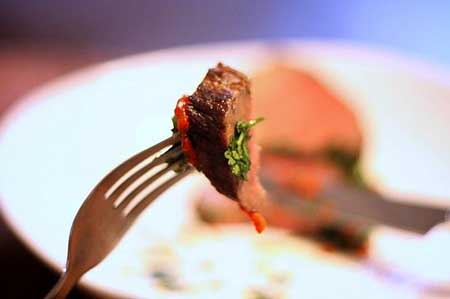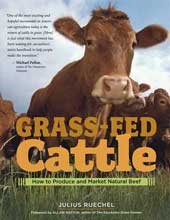How Tender is Grass Fed Beef?

Image Credit: Joshua Rappeneker, Flickr, CC BY-SA 2.0
"Is grass fed beef tough or tender?"
Beef tenderness has nothing to do with what cattle eat while they are being fattened (finished) for slaughter. Feed source is irrelevant to toughness or tenderness.
Instead tenderness has everything to do with slaughtering at the right time - when the cattle reach their ideal level of fatness - and not a moment sooner.
If cattle are fat enough when they are slaughtered, their meat will be tender. If they are not fat enough, their meat will be tough. Period. This is true regardless of whether cattle are fattened on grass or on a grain-rich diet. For all it matters to tenderness, they could even be fattened on stale doughnuts, root beer or leftover pulp from the orange juicing industry! Finishing (fattening) is about calories, not food source.
Until cattle get fat enough, their beef will be tough, but once there is enough fat inside the beef (what the industry calls being "finished"), their beef will be tender regardless of what they ate to get fat.
Consequently, there is NO inherent difference in tenderness between grass finished and grain finished beef.
But there is a huge difference in tenderness between under-finished and properly-finished beef!
However, while feed source is irrelevant to tenderness, there is a HUGE difference in tenderness between under-finished beef (too little fat) and properly-finished beef (the correct amount of fat for slaughter). And that difference boils down to the skill of the farmer producing the beef.
If you come across a tough steak (whether grass fed or grain fed), it means the beef animal was slaughtered before it reached its ideal slaughter weight and ideal fatness. That means the farmer slaughtered before the cattle were ready.
The farmer is the weakest link
Unfortunately there are huge differences in skill levels among farmers, both among grass finished and grain finished beef producers, just as there are differences in skill levels in any other profession.
Finishing cattle (on grass or grain) is a skill no different than learning any other skill (plumbing, engineering, driving, or writing). And just like becoming an expert at any other skill, it's about learning to pay attention to all the little details and coordinate them into a seamless strategy (You can learn more about all the little details that must be coordinated in a successful cattle finishing strategy in the Seven Unbreakable Rules of Producing Great Beef).
A tough steak simply means that your beef farmer lacks experience - his cattle finishing skills are lacking. So choose your beef supplier well and be ready to move on to a different beef supplier if your current farmer's skill does not meet your expectations.
Test your farmer's skill level... with your teeth!
The good news is that you don't need to know all about cattle finishing to judge your farmer's skill level. Beef tenderness is a fantastic gauge - your teeth will tell you all you need to know about your farmer's skill and experience.
You may also want to read the article about cooking grass fed beef to ensure that your cooking strategy does not impact beef tenderness - there are some differences you should be aware of when you cook grass fed beef so your cooking technique doesn't undo your beef farmer's hard work in producing a tender flavorful beef product.
Do you like eating grass fed beef?
Do you like grass fed beef? Has it been tender or tough? Do you have any favorite cooking tips for when you serve grass fed beef to your family?
Share your comments, thoughts and grass fed cooking tips in the comments boxes below! And don't forget to "Like" us on Facebook or Twitter and to subscribe to my email updates for more great info about grass fed beef!
Image Credit: Joshua Rappeneker, Flickr, CC BY-SA 2.0



